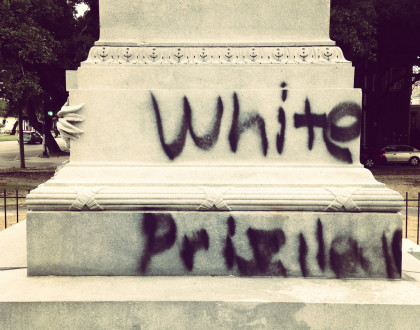Standing Amidst “Power”

In the same month that YWCA Boston is sponsoring the city’s third annual Stand Against Racism, Boston Magazine has distributed its April issue entitled “POWER” with the main story featuring “The 50 People Who Run This Town.” The magazine’s cover proudly presents 10 leaders from its “power list,” nearly all of whom are white (and 6 of whom are white men). A casual glance of the magazine cover in a local store renders yet another cognitive coupling of whiteness and power, reinforcing a cultural script that defines whiteness as naturally superior. Ironically titled “The Power Complex,” the article appears to deconstruct itself as the title suggests a correlation between whiteness and not only power complexes but power as “sheer force of will.” Of the 50 people ranked as those who “run this town,” at least 40 are white; the major exceptions being Boston City Councilor Ayanna Pressley and Massachusetts Governor Deval Patrick.
Perhaps what is most harmful about this cover image is that it normalizes an image of “POWER” with an image of whiteness; more specifically, an image of whiteness that remains an invisible standard left unquestioned. By emphasizing “traditional power” as localized in a specific intersection of race, class, and gender, the article not only homogenizes power as a largely white affluent male enterprise but also ignores the very powerful innovations being made by people and diverse organizations in Boston who do not fit this category.
The article introduces Boston’s “power list” by describing these 50 leaders as “the players charting new directions for our city.” However, the framing of such leaders as predominantly white only seems to reiterate the past and Boston’s recurring legacy of racism. It is important to challenge the images precisely because something a commonly picked up as a magazine reproduces cultural imaginaries of race, class, and gender based on oppressive assumptions.
YWCA Boston’s Stand Against Racism is a direct response to such social complicities. In addition to its ongoing facilitations of community dialogues on race and ethnicity, YW Boston has innovative programming that is addressing these issues for both the present and future. Its LeadBoston program brings together local business executives for experiential learning about key disparities in Boston and its Youth Leadership Initiative is fostering a progressive community of local high school youth who are already shaping Boston’s future. YW Boston has recruited nearly 100 participating sites for the 2012 Stand Against Racism, and its continuing efforts insure that standing against racism and other intersecting systems of oppression will be its overarching primary goal every day of the year.
More information about YW Boston and its programming can be found at ywboston.org
